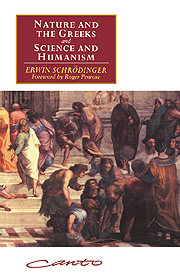Book contents
- Frontmatter
- Contents
- Foreword
- NATURE AND THE GREEKS
- I The motives for returning to ancient thought
- II The competition, reason v. senses
- III The Pythagoreans
- IV The Ionian Enlightenment
- V The religion of Xenophanes. Heraclitus of Ephesus
- VI The Atomists
- VII What are the special features?
- References
- SCIENCE AND HUMANISM
VI - The Atomists
Published online by Cambridge University Press: 05 July 2014
- Frontmatter
- Contents
- Foreword
- NATURE AND THE GREEKS
- I The motives for returning to ancient thought
- II The competition, reason v. senses
- III The Pythagoreans
- IV The Ionian Enlightenment
- V The religion of Xenophanes. Heraclitus of Ephesus
- VI The Atomists
- VII What are the special features?
- References
- SCIENCE AND HUMANISM
Summary
Is the ancient atomic theory, which is attached to the names of Leucippus and Democritus (born around 460 B.C.), the true forerunner of the modern one? This question has often been asked and very different opinions about it are on record. Gomperz, Cournot, Bertrand Russell, J. Burnet say: Yes. Benjamin Farrington says that it is, ‘in a way’, and that the two have a lot in common. Charles Sherrington says: No, pointing to the purely qualitative character of ancient atomism and to the fact that its basic idea, embodied in the word ‘atom’ (uncuttable or indivisible), has made this very name a misnomer. I am not aware that the negative verdict has ever passed the lips of a classical scholar. And when it comes from a scientist, he always shows by some remark that he regards chemistry—not physics—as the proper domain of the notions of atoms and molecules. He will mention the name of Dalton (born 1766) and omit, in this context, the name of Gassendi (born 1592). It was the latter who definitively reintroduced atomism into modern science, and he came to it after studying the fairly substantial extant writings of Epicurus (born around 341 B.C.), who had taken up the theory of Democritus, of which only scarce original fragments have come down to us.
- Type
- Chapter
- Information
- 'Nature and the Greeks' and 'Science and Humanism' , pp. 75 - 89Publisher: Cambridge University PressPrint publication year: 1996

